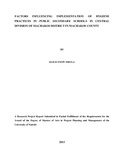| dc.description.abstract | This study was set to investigate the factors influencing implementation of hygiene practices in
public secondary schools in Central Division of Machakos District in Machakos County. The
study was guided by objectives namely; to establish whether availability of soap influences
implementation of hygiene practices in public secondary schools in Central Division of
Machakos District, to establish whether availability of safe water influences implementation of
hygiene practices in public secondary schools in Central Division of Machakos District, to
establish the relationship between availability of toilets and the implementation of hygiene
practices in public secondary schools in Central Division of Machakos District and to investigate
the relationship between availability of sanitary towel disposal bins and implementation of
hygiene practices in public secondary schools in Central Division of Machakos District. The
study adopted a theoretical framework from Hubley (1993) model known as BASNEF on why
people change their hygiene behaviors. The researcher formulated a conceptual frame work
which showed the relationship between availability of soap, water, toilets and sanitary towel
disposal bins as the independent variables and hygiene practices as the dependent variable. The
conceptual framework incorporated moderating variables namely student’s attitudes, religion,
customs and culture and intervening variables namely school finance, policies, management and
student background. The study looked at literature review from other researchers on hygiene
practices and reviewed their findings on independent variables under study. Descriptive survey
research design was adopted. A target population of 30 schools and 4481 students and 30
principals from Central Division was selected and a sample size of 28 schools, 354 students and
28 principals was selected by use of Krejcie table and formulae. Questionnaire and interview
schedules were used as research instruments to collect data and they were tested for validity
using content validity and tested for reliability using Pearson correlation coefficient of split half
method. Data was analyzed by using descriptive statistics for quantitative data, by use of
frequency tables, percentages and measures of central tendency. Hypotheses was tested using
one way analysis of variance (ANOVA) since hygiene practice as the dependent variable was
measured at interval scale while the independent variables were measured at the nominal scale.
Regression prediction models were developed for estimating implementation of hygiene
practices. The findings of this study would provide several groups of people with a better
understanding of factors influencing implementation of hygiene practices and perhaps encourage
them to practice and improve hygiene in their own organizations. The study found out that
availability of water has the greatest influence on implementation of hygiene practices and was
followed by availability of soap while availability of sanitary towel disposal bins does not have a
strong influence. | en |

